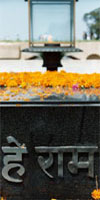
|
|
|
|
May 17, 2007 Young India briefs US Congress on developments in India Young India, Inc. in co-operation with Congressman
Jim McDermott (D,WA-7) and Congressman
Joe Wilson (R, SC-2), co-chairs of the Congressional India Caucus hosted
a briefing on May 17th on Capitol Hill that brought together a distinguished
panel to analyze the recent events in India and their potential impact on India
and Indo-US relations. The event focused on security in South Asia, India’s
economic strengths and weaknesses and the effect of India’s political
climate for present and future Indo-US relationships while further exploring
the socio-political landscape of the world’s largest democracy.
The briefing was moderated by Congressman Jim McDermott (D, WA-7) who opened the proceedings stressing the importance of such events to policymakers and their staff. He said, “It’s not always easy, even if you have the Hindustan Times on your favorites list, to understand what’s going on [in India].” He commended the truly comprehensive and amazing electoral process in India while putting into perspective the recently completed state elections in Uttar Pradesh and other Indian states. Congressman McDermott demonstrated his deep interest and affection for India throughout the briefing by sharing his views as well as probing the speakers. Congressman Joe Wilson (R, SC-2), co-chair of the Congressional India Caucus, was supportive of the briefing by saying, “It’s very helpful to have the reviews we are hearing today so that we can best promote, what I think is a strong and strategic relationship between India and the United States.” A long-time and passionate supporter of India, Congressman Wilson said it was a “most exciting time” in Indo-US relations, the world’s largest and oldest democracies. Mr. Michael Krepon, co-founder of the Henry L. Stimson Center, began the briefing by focusing on the factors important to the geo-political security environment in South Asia. He commended successive coalition governments in India for improving its regional and global security relations by engineering positive ties with both China and the US. He then turned his focus to Indo-US relations, specifically the nuclear agreement between the two countries. In his opinion, by pitting non-proliferation against ties with India, both governments had created a “lose-lose proposition.” He expressed his surprise and displeasure at the centrality that this deal had acquired in this important bilateral relationship that could be enhanced via a myriad of alternative policy collaborations. He expressed serious doubts about any concrete outcomes resulting from the deal, vis-à-vis the establishment of nuclear power plants, stating that “without liability insurance for a nuclear power plant, you don’t turn the key”. His concerns stemmed from the fact that in 1984 the Bhopal Gas tragedy claimed over 20,000 lives and given this public safety disaster he had a ”hard time seeing the Indian parliament pass liability insurance laws [that would dilute existing statutes for other multinational companies whose production facilities could pose a similar or even greater threat to public safety]”. Moving onto India’s political relationship with Pakistan, he expressed optimism at the current state of affairs stating that” it can be argued that Indo-Pak relations have never been better”. Discussing Kashmir, he explained that what was historically a conflict based on “religion, territory, sovereignty, and inheritance” has been transformed into one hinged on domestic political realities. He credited both governments for this positive transformation, but cautioned that neither government is “out of the woods” on the issue. He concluded by noting that he was “both realistic and optimistic” regarding Indo-Pak relations. Prof. Arvind Panagariya, Jagdish Bhagwati Chair of Indian Political Economy, Columbia University, was the next speaker. He addressed the economic situation in India. Stressing on the importance of India’s recent economic growth he attributed India’s growing importance in the geo-political sphere to its stronger economy. Elaborating on the positives of the Indian economic reforms, he stated that in the last 20 years the proportion of the poor in the country’s population has fallen by around 50%, primarily driven by economic growth. Moreover, he expressed a belief that India could sustain a growth rate of around 8% for the next 8-10 years at least, based on structural changes in the economy. As an indicator of how structural changes have positively impacted the economy, he alluded to the trade to GDP ratio in India which has risen from 25% to 44% in the last 5 years. Listing the success stories of the economic reforms, he mentioned that sectors like telecommunications, automobiles, and software have benefited maximally from these reforms. Prof. Panagariya then drew the audience’s attention to a specific area of concern that correlates employment with the current economic trajectory pointing out that as many as 90% of India’s non-agricultural workforce is employed in the informal sector. (65% of India’s workforce is in the agricultural sector). For a detailed/comprehensive reference to India’s economy he referred the audience to his upcoming book publication titled “India: An Emerging Giant”. Mr. Rohit Tripathi, President of Young India, was the final speaker. He discussed India’s internal political dynamics. Explaining the relevance of this topic, he reasoned that it was crucial to understand “how issues and positions evolve through the political process [in India]” so that a more responsive and relevant set of policies could be formulated. Delving into the recent elections in the state of Uttar Pradesh (UP). Mr. Tripathi analyzed what Ms.Mayawati’s electoral success means for the larger political picture. He drew attention to the strategy that Ms. Mayawati had employed for the recent election and in his opinion he felt if this strategy (of building a coalition of upper and lower castes) yielded similar results in a few more states then the 2009 general election could see some interesting potential coalitions coming together. Mr. Tripathi said, “If indeed a Third Front [other than the BJP or Congress Party] did emerge then its foreign policy and economic outlook would be anyone’s guess.” He alerted the audience to the fact that little is currently known about the positions a Ms. Mayawati government in New Delhi may take. Mr. Tripathi conceded that only 46% of the electorate had voted in the UP elections so we must accordingly judge the impact of the results. In concluding his remarks he urged policymakers to track the political developments leading up to the 2009 general election. Some key state elections are coming up this year and early in 2008 (refer to the PDF Fact Sheet prepared by Young India found here). The incumbent Congress Party and its main rival the BJP are on weak footing going into these last 2 years. Mr. Tripathi warned that India’s incumbent policymakers will have to modulate their policies with better political messaging to convey to the people that they truly represents the interest of the wider population. Mr. Sean Hughes from Congressman McDermott’s office efforts was
instrumental in conceptualizing and executing this briefing. Mr. Dino Teppara’s
and Mr. Paul Callahan’s (from Congressman Joe Wilson’s office)
cooperation in the organizing of this event is truly appreciated as well.
|
    | |||||||||||||||||||||||||||
| © 2000-2007 Young India, Inc. All rights reserved. |


